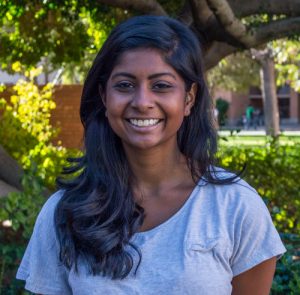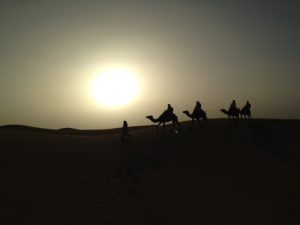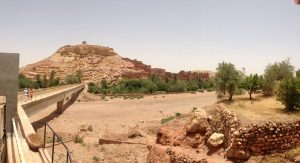
‘Sustainability is built into context’
Saritha, a junior in the School of Sustainability also studying economics and English Literature, visited Spain and Morocco last summer through the Global Sustainability Studies Program. Ramakrishna was most interested in exploring the interactions between the two regions, especially when it comes to sustainability policy and practice. Here, she shares her observations from her travels.
Why did you choose to study sustainability in Spain and Morocco?
I chose this particular program because it seemed to represent how sustainability is this nebulous term that’s really defined by the surrounding context. The two countries, though vastly different places, are constantly interacting, both culturally and economically. I was interested in this interaction, and also in how it manifested itself in both countries’ goals in developing their renewable energy sectors.
Studying abroad had me looking at the topics I’ve studied in class differently. There was a sense of applicability to the academic rhetoric I’d been used to reading or hearing about in a lecture. However, there was also this kind of dissonance, in that I realized that classroom learning is oftentimes just a simple outline or structure for the topic at hand, especially in this particular field. In reality, issues such as economic development, modernization and resource management are infinitely complex.
How do Spain and Morocco compare when it comes to sustainability?
In one of our meetings in Morocco, we were able to speak with a group of young policy analysts. One of them who had recently visited the U.S. pointed out how absurd something like urban agriculture the way it is understood here in the U.S. would sound in Morocco. To me, that illustrates that sustainability is built into context. We learned that Morocco is in a current state of transition in pushing to become competitive in the global market, and that sustainability does fit into this overarching plan for economic development. Spain is at a decidedly different point. Both face sustainability challenges unique to their economies, geographies and cultures.
How are you using what you learned during your trip in your current life?
I’m planning to take Arabic classes until I graduate. While abroad, I think we all realized how skilled people in that region can be when it comes to cultural adaptability. We met many people fluent in three languages or even more. In addition, studying the particular topics that we did surrounding renewable energy development also inspired me in part to add an economics major to my sustainability degree.
What did you love most about Morocco? Spain?The people we met in Morocco were incredibly friendly and welcoming, and they all had this great sense of humor. I also loved the different types of landscapes we were able to experience, since were able to see a lot of Morocco. Spending the night in the Sahara Desert was incredibly surreal, and was one of my favorite parts of the trip.
In Spain, I loved how the modern elements of cities were built into places with so much history. Our visit to the Alhambra was a perfect example of that. We were also able to visit the Prado in Spain, as well as a Salvador Dali exhibition, which were both interesting highlights.

What’s one lesson you learned that you will carry with you?
This might go for all study abroad trips, but there’s a certain level of organized chaos you have to learn to embrace and trust being in a place that you don’t fully understand. It’s kind of a great thing though, because you sometimes have to relearn basic day to day functions and habits. Though it was a relatively short trip, I learned the importance of adaptability.


